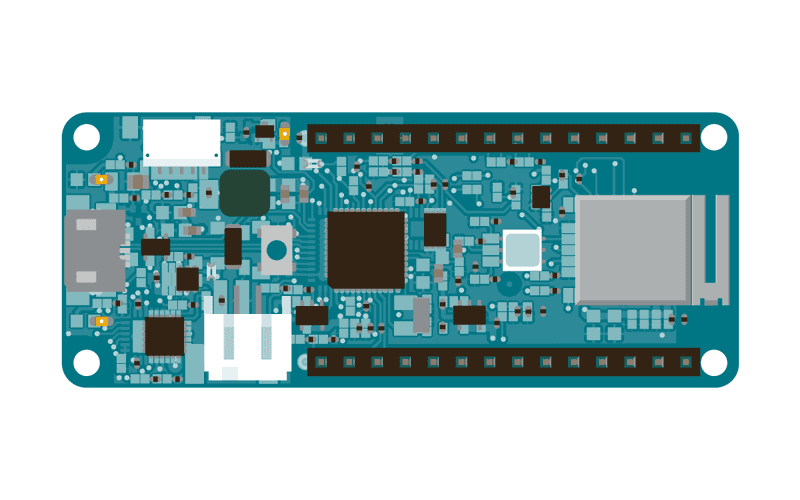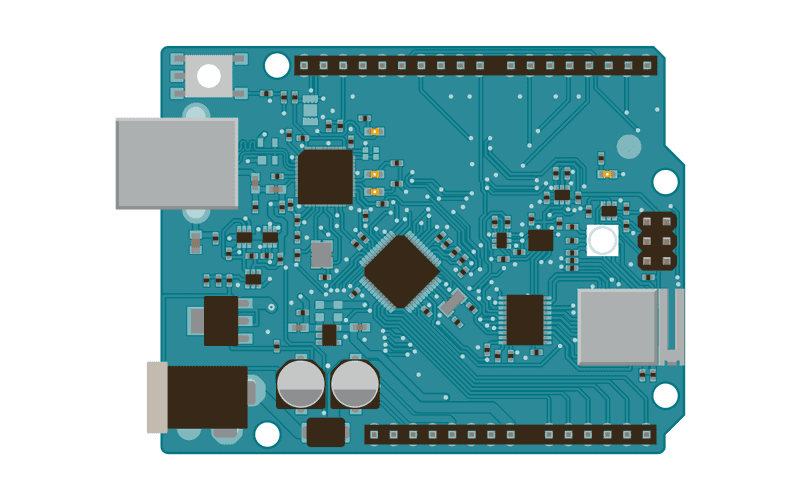Scan Networks Advanced
This example scans for 802.11b/g network with one of the boards that support this library. Your Arduino Software (IDE) serial monitor will print out information about the board and the networks it can see, with the encryption type. It will not connect to a network.
Hardware Required
Circuit
The WiFi module is integrated on your board and you don't need any special circuitry to get this tutorial to work.
 Arduino MKR WiFi 1010
Arduino MKR WiFi 1010
 Arduino MKR VIDOR 4000
Arduino MKR VIDOR 4000
 Arduino UNO WiFi Rev.2
Arduino UNO WiFi Rev.2
Please note: these three boards use dedicated pins to communicate and select the WiFi module, therefore you have no restriction in the usage of the available digital pins connected to the header pins.
Code
Open your Arduino Software (IDE) serial monitor to view the networks the WiFi module can see. The shield may not see as many networks as your computer, but it will show also the encryption type.
/*
This example prints the board's MAC address, and
scans for available WiFi networks using the NINA module.
Every ten seconds, it scans again. It doesn't actually
connect to any network, so no encryption scheme is specified.
BSSID and WiFi channel are printed
Circuit:
* Board with NINA module (Arduino MKR WiFi 1010, MKR VIDOR 4000 and UNO WiFi Rev.2)
This example is based on ScanNetworks
created 1 Mar 2017
by Arturo Guadalupi
*/
#include <SPI.h>
#include <WiFiNINA.h>
void setup() {
//Initialize serial and wait for port to open:
Serial.begin(9600);
while (!Serial) {
; // wait for serial port to connect. Needed for native USB port only
}
// check for the WiFi module:
if (WiFi.status() == WL_NO_MODULE) {
Serial.println("Communication with WiFi module failed!");
// don't continue
while (true);
}
String fv = WiFi.firmwareVersion();
if (fv < WIFI_FIRMWARE_LATEST_VERSION) {
Serial.println("Please upgrade the firmware");
}
// print your MAC address:
byte mac[6];
WiFi.macAddress(mac);
Serial.print("MAC: ");
printMacAddress(mac);
// scan for existing networks:
Serial.println();
Serial.println("Scanning available networks...");
listNetworks();
}
void loop() {
delay(10000);
// scan for existing networks:
Serial.println("Scanning available networks...");
listNetworks();
}
void listNetworks() {
// scan for nearby networks:
Serial.println("** Scan Networks **");
int numSsid = WiFi.scanNetworks();
if (numSsid == -1)
{
Serial.println("Couldn't get a WiFi connection");
while (true);
}
// print the list of networks seen:
Serial.print("number of available networks: ");
Serial.println(numSsid);
// print the network number and name for each network found:
for (int thisNet = 0; thisNet < numSsid; thisNet++) {
Serial.print(thisNet + 1);
Serial.print(") ");
Serial.print("Signal: ");
Serial.print(WiFi.RSSI(thisNet));
Serial.print(" dBm");
Serial.print("\tChannel: ");
Serial.print(WiFi.channel(thisNet));
byte bssid[6];
Serial.print("\t\tBSSID: ");
printMacAddress(WiFi.BSSID(thisNet, bssid));
Serial.print("\tEncryption: ");
printEncryptionType(WiFi.encryptionType(thisNet));
Serial.print("\t\tSSID: ");
Serial.println(WiFi.SSID(thisNet));
Serial.flush();
}
Serial.println();
}
void printEncryptionType(int thisType) {
// read the encryption type and print out the name:
switch (thisType) {
case ENC_TYPE_WEP:
Serial.print("WEP");
break;
case ENC_TYPE_TKIP:
Serial.print("WPA");
break;
case ENC_TYPE_CCMP:
Serial.print("WPA2");
break;
case ENC_TYPE_NONE:
Serial.print("None");
break;
case ENC_TYPE_AUTO:
Serial.print("Auto");
break;
case ENC_TYPE_UNKNOWN:
default:
Serial.print("Unknown");
break;
}
}
void print2Digits(byte thisByte) {
if (thisByte < 0xF) {
Serial.print("0");
}
Serial.print(thisByte, HEX);
}
void printMacAddress(byte mac[]) {
for (int i = 5; i >= 0; i--) {
if (mac[i] < 16) {
Serial.print("0");
}
Serial.print(mac[i], HEX);
if (i > 0) {
Serial.print(":");
}
}
Serial.println();
}See Also:
WiFi NINA library - Your reference for the WiFiNINA Library.
Arduino MKR WiFi 1010 - Product details for the Arduino MKR WiFi 1010 board.
Arduino MKR VIDOR 4000 - Product details for the Arduino MKR VIDOR 4000 board.
Arduino UNO WiFi Rev.2 - Product details for the Arduino UNO WiFi Rev.2 board.
AP_SimpleWebServer : A simple web server to manage a LED with AP feature
ConnectNoEncryption : Demonstrates how to connect to an open network
ConnectWithWEP : Demonstrates how to connect to a network that is encrypted with WEP
ConnectWithWPA : Demonstrates how to connect to a network that is encrypted with WPA2 Personal
ScanNetworks : Displays all WiFi networks in range
SimpleWebServerWiFi : A simple web server to manage a LED
WiFiChatServer : Set up a simple chat server
WiFiPing : Demonstrates how to ping a website or IP address
WiFiSSLClient : Connect to a website using SSL
UdpNTPClient : Query a Network Time Protocol (NTP) server using UDP
WiFiUdpSendReceiveString : Send and receive a UDP string
WiFiWebClient : Connect to a remote webserver
WiFiWebClientRepeating : Make repeated HTTP calls to a webserver
WiFiWebServer : Serve a webpage from the WiFi module
Last revision 2018/07/12 by SM